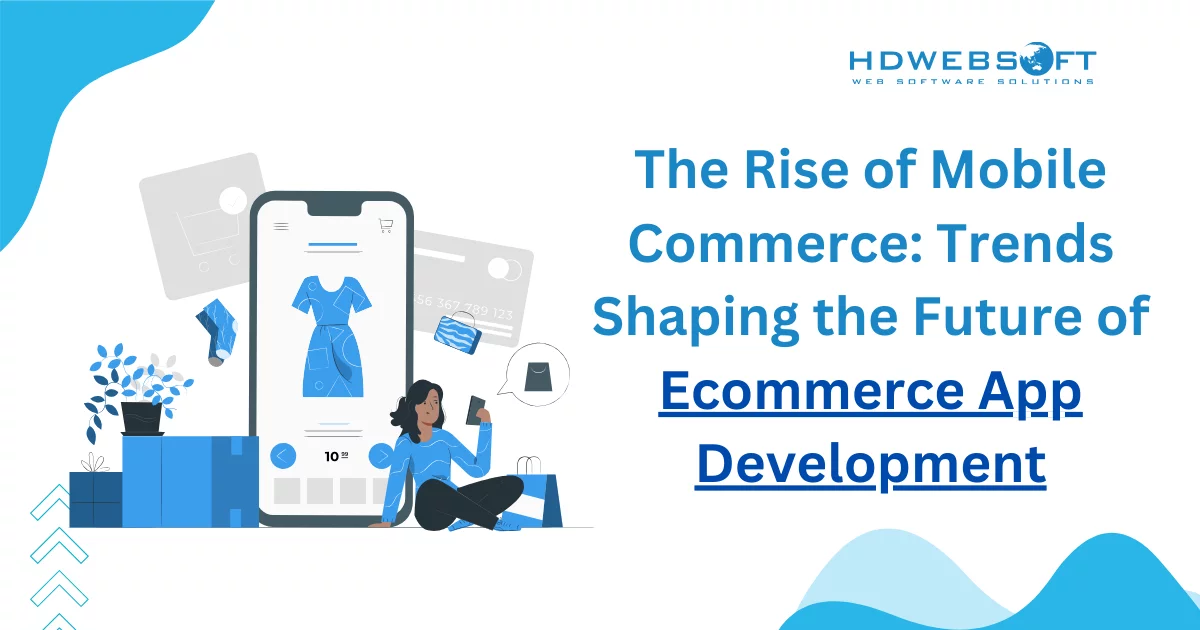
Ecommerce App Development Trends and The Rise of Mobile Commerce
The digital landscape is witnessing a seismic shift. Consumers are increasingly turning to their mobile devices for everything, from research and communication to entertainment and, most importantly for businesses, shopping. This mobile-first approach has fueled the meteoric rise of mobile commerce (eCommerce), and businesses that fail to adapt and implement ecommerce app development risk getting left behind.
The Power of Mobile Commerce in Today’s Digital World
Mobile commerce has become an undeniable force in the retail industry, almost businesses have already applied ecommerce app development. Here’s why:
-
Convenience Reigns Supreme:
Consumers crave convenience, and mobile apps offer a seamless shopping experience right at their fingertips. Browse products on the bus, compare prices while waiting in line, or make a purchase during a coffee break – mobile commerce empowers customers to shop anytime, anywhere.
-
Increased Accessibility:
Smartphones boast a near-ubiquitous presence. Unlike desktops or laptops, which require a specific location for access, mobile devices are constantly with us. This accessibility translates to a wider potential customer base for your business.
-
Personalized Shopping Experiences:
Mobile apps offer a unique opportunity to personalize the shopping experience. Leverage customer data and browsing behavior to recommend relevant products, offer targeted promotions, and cater to individual preferences.
Why the Mobile Commerce Boom?
Several factors contribute to the ever-increasing popularity of mobile commerce:
-
Technological Advancements:
Faster processors, improved mobile internet connectivity, and larger screen sizes on smartphones have all contributed to a more enjoyable mobile shopping experience.
-
Rise of Social Media:
Social media platforms have blurred the lines between browsing and buying. Consumers can now discover new products and make purchases directly within their favorite social media apps. Utilizing a video editor can significantly enhance your content by creating captivating videos that attract consumers’ attention and drive them to make quick purchasing decisions.
-
Improved Security:
Security concerns surrounding mobile payments have diminished significantly. Secure payment gateways and fingerprint or facial recognition authentication features give consumers confidence to shop on their devices.
Explore in depth: Mobile App Development Company | Services
Key Trends in Ecommerce App Development: Charting the Course for Success
To stay ahead of the curve in the competitive eCommerce landscape, here are some key trends to consider while implementing your ecommerce app development:
Emphasis on User Experience (UX) Enhancements
-
Simple and intuitive navigation:
Users should be able to find what they’re looking for quickly and easily. Ecommerce app development helps to utilize clear and concise labels, and implement intuitive search functions with auto-complete suggestions. This ensures a smooth, frustration-free journey for your customers.
-
Fast loading times:
In today’s fast-paced world, patience is a rare commodity. Nobody wants to wait for an app to load, especially when faced with countless other shopping options. Optimize your app for speed by compressing images, minimizing HTTP requests, and leveraging code caching techniques. A lightning-fast app keeps users engaged and coming back for more.
-
Seamless checkout process:
The checkout process is the final hurdle between a browsing customer and a paying one. When you deploy your ecommerce app development, you should make it as smooth and frictionless as possible. Minimize the number of steps required to complete a purchase. Consider offering one-click ordering for returning customers or pre-fill forms with saved customer information to eliminate unnecessary data entry.
Integration of Emerging Technologies
-
Artificial Intelligence (AI) Enhances the Shopping Journey:
AI is no longer science fiction; it’s here to revolutionize the mobile shopping experience. Leverage AI to personalize product recommendations for each customer based on their browsing behavior and purchase history. Imagine a customer browsing for running shoes, and the app suggests personalized recommendations for socks, insoles, or even training programs based on their individual needs. Furthermore, AI-powered chatbots can provide 24/7 customer support, answering basic questions and resolving simple issues. AI can even optimize search functionality within your app by understanding user intent and suggesting relevant products or categories even if the search terms are not a perfect match.
-
Augmented Reality (AR) Blurs the Lines Between Physical and Digital:
AR allows customers to virtually experience products before they buy. Imagine trying on clothes or visualizing furniture placement in their homes. This immersive and interactive experience not only enhances the shopping experience but also significantly boosts conversion rates. Studies have shown that customers who engage with AR features are more likely to make a purchase and tend to spend more. By embracing AR technology, you can create a unique and engaging shopping experience that sets your mobile app apart from the competition.
Integration of Ecommerce Platforms
-
Seamless integration:
Your mobile app should integrate seamlessly with your chosen ecommerce platform. This ensures a smooth flow of data and avoids inconsistencies between your app and website. magine a customer adding an item to their cart on your website and being able to access that same cart within the app seamlessly. This consistency avoids data silos and ensures a frustration-free shopping journey.
-
Compatibility with other business systems:
The power of your mobile app extends beyond just facilitating sales. Ecommerce app development can be integrated with other essential business systems to create a holistic view of your operations. Here are some key integrations to consider:
-
Invoicing Software:
Streamline your back-office processes by integrating your app with invoicing software. This allows you to automatically generate invoices for mobile app purchases, saving time and reducing the risk of errors.
-
CRM (Customer Relationship Management):
Gain valuable insights into customer behavior by integrating your app with your CRM system. Track customer purchase history, preferences, and communication within the app, allowing you to personalize future marketing campaigns and promotions.
-
WMS (Warehouse Management System):
Ensure efficient inventory management by integrating your app with your WMS. This provides real-time stock visibility, allowing you to update inventory levels within the app as products are purchased, shipped, or returned. This reduces the risk of overselling and ensures a smooth fulfillment process.
-
HRM (Human Resource Management):
For businesses with a physical storefront, consider integrating your app with your HRM system. This allows employees to manage tasks, access customer information, and even process returns directly from the app, streamlining in-store operations and enhancing customer service.
Importance of Responsive Design and Cross-Platform Compatibility
-
Responsive design:
Your app should adapt to different screen sizes and devices, ensuring optimal performance on smartphones, tablets, and even desktops if applicable.
-
Cross-platform compatibility:
Develop your app to be compatible with both Android and iOS operating systems to reach a wider audience.
The Impact of Ecommerce App Development Trends
Embracing these ecommerce app development trends can have a significant positive impact on your business:
- Increased Sales and Conversions: A user-friendly and feature-rich app can significantly improve conversion rates and boost sales.
- Enhanced Customer Engagement: Mobile apps allow for deeper customer engagement through push notifications, personalized recommendations, and loyalty programs.
- Brand Recognition and Visibility: A well-designed app can increase brand awareness and visibility among your target audience.
Learn more about: Ecommerce Software Development Company | Services | Solutions
Conclusion
The rise of mobile commerce and ecommerce app development is transforming the retail landscape, offering businesses unprecedented opportunities to engage with consumers and drive sales on mobile devices. By embracing the latest trends in mobile commerce, such as Progressive Web Apps, Augmented Reality, Voice Commerce, Personalization, and Mobile Payments, businesses can create immersive and frictionless shopping experiences that resonate with today’s mobile-first consumers. As the mobile commerce revolution continues to evolve, businesses must stay agile and innovative to stay ahead of the curve and capitalize on the vast potential of mobile commerce.











